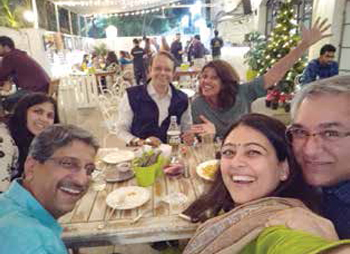What is it that differentiates the “retiring” fifty something’s from the perpetually agile and active sixty, seventy and eighty-year olds? The latter believe that there is something to be achieved and definitely a lot to contribute to the world
 Living life to the fullest
Living life to the fullestA fortnight of hectic travel, crisscrossing the country twice took me through multiple temperature zones, unique cultural nuances and also an introduction to completely different approaches to thinking about aging and life.
The travel started in Chennai, where we attended a wedding and spent a lovely weekend listening to the amazing voices of Carnatic music maestros, Ranjani-Gayatri and Sanjay Subrahmanyan at the Chennai Music festival.
Two days in Goa followed for the Serendipity Arts Festival and the national council meeting of the All India Management Association. Back to South India and Bengaluru for another wedding and a Board meeting and then a dash to the cold wave and abominable air pollution in Delhi to speak at the annual meeting of the Indian Electrical and Electronics Manufacturers Association.
Finally, to Ranchi for an engineering college batch reunion in near freezing temperature and a visit to an amazing social initiative of the Pan IIT Reach for India Foundation in partnership with the Government of Jharkhand.
And at last, back to Pune to attend the trustees meeting of the Pune International Center and spend a week in office planning with our five group CEOs for the New Year.
My constant companion on this ten-day journey was the latest book Homo Deus written by my favorite author Noel Harari. Harari has an interesting hypothesis that by the end of this century, man, as we know him, will cease to exist in the current form because of gene manipulations and artificial organs. Multiple advances in biology and medical sciences will also enable human life to be prolonged well beyond the century that is today a matter of celebration. In the eventuality that humans start looking at 120 or even 150 years as a typical lifespan, Harari argues that every thinking person will stop thinking of either careers or relationships as finite and single. Every person can seriously expect to have at least three serious relationships, attempt multiple professions and need lifelong learning of new skills as job imperatives and opportunities change over the decades of a single person’s existence. And that leads me to the core point of this piece -what will be the definition of old in a lifetime of 120 years and when does a person in the new context really give himself or herself the opportunity to retire and do nothing?
If we can all ensure that there is mutual respect between the old and the young, paradoxically the old will also stay young forever
This question was underlined by two completely different experiences during my travels. The sixty or so engineering classmates from the 1978 graduating batch of the Birla Institute of Technology, Mesra who assembled in Ranchi demonstrated three interesting states of mind. There were those who had worked for Tata Steel or Coal India or a public sector like BHEL and had logically retired at the age of fifty-eight or sixty and were full of armchair conversation about politics, cricket and their exciting grandchildren. There were others who were part of a family business and were looking forward to their sons and nephews taking over the reins and allowing them to fade into the sunset. And finally, there were a handful of private sector folk like me who continued to pursue their work passions and had the energy still left to go on and climb new mountains and create new success stories in their life. We in the last category would welcome the Harari hypothesis that we can build life anew but the majority of sixty-year-olds would be horrified at having to continue to work and that too learn new tricks!
The second experience that reassured me that it was not just Indian politicians who considered themselves career worthy in their sixties and seventies was the meeting in Pune of a dozen trustees of PIC with an average age well beyond seventy. This group, excited by the growth and success of this young institution in thought leadership, policy research and multiple initiatives for the good of society and led by living legends like former Finance Secretary Vinay Kelkar, scientist extraordinaire Raghunath Mashelkar, industry doyen Anu Aga and education missionary SB Mujumdar, founder of Symbiosis is an entity that is young in mind and heart and proud of the fact that its membership consists of all ages all working shoulder to shoulder to further our mission to improve thought and action in Pune.
What is it that differentiates the “retiring” fifty something’s from the perpetually agile and active sixty, seventy and eighty-year-olds? The latter believe that there is something to be achieved and definitely a lot to contribute to the world. They will continue to challenge conventional wisdom and drink from new fountains of knowledge.
Senior citizens should be celebrated for their years of accumulated wisdom and they need to retain the sagacity to share without preaching and advise the younger generations without moralizing. And if we can all ensure that there is mutual respect between the old and the young, paradoxically the old will also stay young forever. And people like me with the incessant travel urge will continue to discover new avenues for learning, sharing and experiencing life to the fullest!
By Dr. Ganesh Natarajan